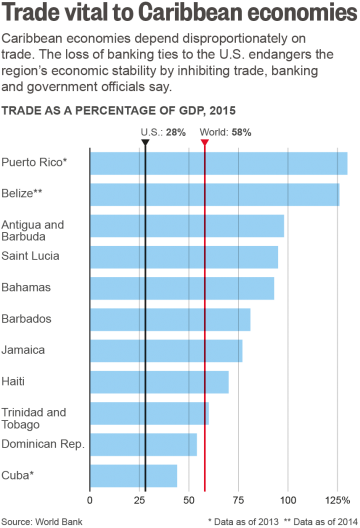Bravenewcoin: Banks abandon the Caribbean, local bitcoin exchange experiences 33% increase in users every month since February
Author: Luke Parker || Adoption || Banking || Bitcoin || Smaller, poorer countries are being abandoned by big banks in an exodus commonly referred to as “de-risking” or “de-banking.” In the Caribbean, where many small countries with poorer populations reside close to each other, the problem is getting so bad that local businesses regularly have a hard time receiving remittances and paying suppliers outside of their own country, even when their trading partner is just the next island over. The growing trend in the Caribbean is the topic of a recent report by the IMF, and the subject of a talk by IMF director Christine Lagarde on Monday, at the US Federal Reserve. According to Madame Lagarde, at least five Caribbean countries were ‘de-risked’ as of this May, with 16 or more international banks withdrawing their correspondent banking relationships. This land-locks the money on some of these island nations, cutting residents and businesses off from foreign trade. Belize is most affected by the trend, but most of the Caribbean is deeply affected. Compounding the problem is that these smaller, poorer countries depend on international trade the most. Madame Lagarde mentioned that such countries are “especially vulnerable,” with citizens in them often depending on remittances from family members who work abroad. These citizens already had minimal access to financial services under the best of circumstances, now they are completely cut off in some areas. The poorer a country is, the more likely that banks will leave due to low profits. The more banks that leave, the less trade that can be done there, and the poorer the country becomes. It’s a vicious cycle that, so the theory goes, can spread like cancer from neighbor to neighbor in regions like the Caribbean. The IMF director used her speech to call on regulators in financial centers, both large and small, to do more to help banks maintain these relationships. It’s a hard sell, however, since the banks waited until their relationships were unprofitable. Spending money fighting regulations may be less expensive than retaining banking relationships in the region. While many solutions are being talked about, the problem in the Caribbean has grown so desperate that it is clear to everyone involved that something major has to change. Few people know the problem as well as Gabriel Abed, CEO and co-founder of Bitt, the Caribbean’s largest bitcoin exchange by volume. BraveNewCoin talked with Abed about the IMF assessment, and the CEO happily reported that bitcoin has “cracked out of the embryonic phase and [bitcoin professionals] are beginning to see the bitcoin movement grow legs across the region.” His view of the problem mirrors that of the IMF. However, it’s more nuanced, according to Abed. It’s more to do with perception and relationships, rather than profits alone: “What the Caribbean is really suffering from is a misperception associated with the ‘offshore’ industry, and a lack of economic and political clout.” Bitt was the recipient of a $16 million investment last April, from Overstock.com’s CEO Patrick Byrne, in what turned out to be a local media circus. Bitt then started offering a central-bank-backed digitized version of the Barbadian Dollar inside of their bitcoin wallet. The company is now on a mission to ease the trade problems that Madame Lagarde has outlined, and plans to do the same for other currencies in the region. Overstock’s Byrne made his investment in Bitt because the startup has been developing a suite of blockchain solutions for central banks to manage issuance of digital currency and monetary policy. Abed says that his team has been “adding a ton of new features to our existing software,” and for us to “Expect to see Bitt deploy a new set of novel blockchain financial tools and products by December 2016.” Without launching an ad campaign, “Bitt has experienced a 33% increase in users each month since February,” primarily from organic search engine traffic. The CEO says that his company has “seen people, on their own, searching online for bitcoin solutions and landing on our homepage.” Gauging customer awareness of the region’s banking problems is problematic, “but the banks are devoting significant attention to the so-called ‘de-risking problem’.” Abed learned of the problems by attending regional banking industry association meetings, “where de-risking was the focus of conversation.” “When you combine a dearth of financial services with heavy dependence on transfers of wealth from abroad,” he concluded, “you end up with an exploitative system that bitcoin and blockchain technology are primed to disrupt.” Cheerfully up for the challenge, Abed told BraveNewCoin that his company will be able to, “Unequivocally,” handle all of the shortfalls from lost bank business. “The more foreign exchange Bitt brings into the region’s financial ecosystem,” he explained, “the more excited central banks, governments, and regional bankers become, and the more the Caribbean grows into a bitcoin and blockchain hub.” Please feel free to vote and comment on today’s content, According to the BNC STEEM index, Steem was trading at $3.7348 at the time of writing. Regards,












very nice news
Nice to see blockchain technology getting using for normal citizens
The intention of bitcoin was to be a digital currency for the people, very nice to see crypto currencies in general aiding society.
i hope steem will go up !
that will be great for the community!
bitcoin on the rise
whoohoo
This will be interesting to watch develop!
very much so, and being from a third world country myself (South Africa), I wish to see blockchain help make a difference to society and the unbanked.
Thank you for posting this story. I'm excited to see how poorer regions of the world adopt cryptocurrencies to help their lagging economies and empower their population.
It will also be interesting to see if the tourism sector in the Caribbean integrates cryptocurrencies within their payment infrastructure and in turn inadvertently educates and influence North American and European tourists.
Thank you for the positive response, I share you enthusiasm for this subject matter.
thanks for the explanation..
pleasure!
Bien que le Bitcoin se répand, surtout sur les populations les plus défavorisées, cela montre bien une chose : Que les gens commencent à ne plus faire confiance aux monnaies des pays. J'avais vu aussi qu'en Grèce, des citoyens mettaient toutes leurs économies en Bitcoin.
Google Translation:
While Bitcoin is spreading, especially on the poorest populations, this shows one thing: That people start to not trust the currencies of countries. I saw also that in Greece, citizens put all their savings into Bitcoin.
Great post! As a caribbean national, I can verify that these banks are a real issue. I wrote an article in response to your post:
https://steemit.com/steemit/@kazumi/cryptocurrencies-in-the-caribbean